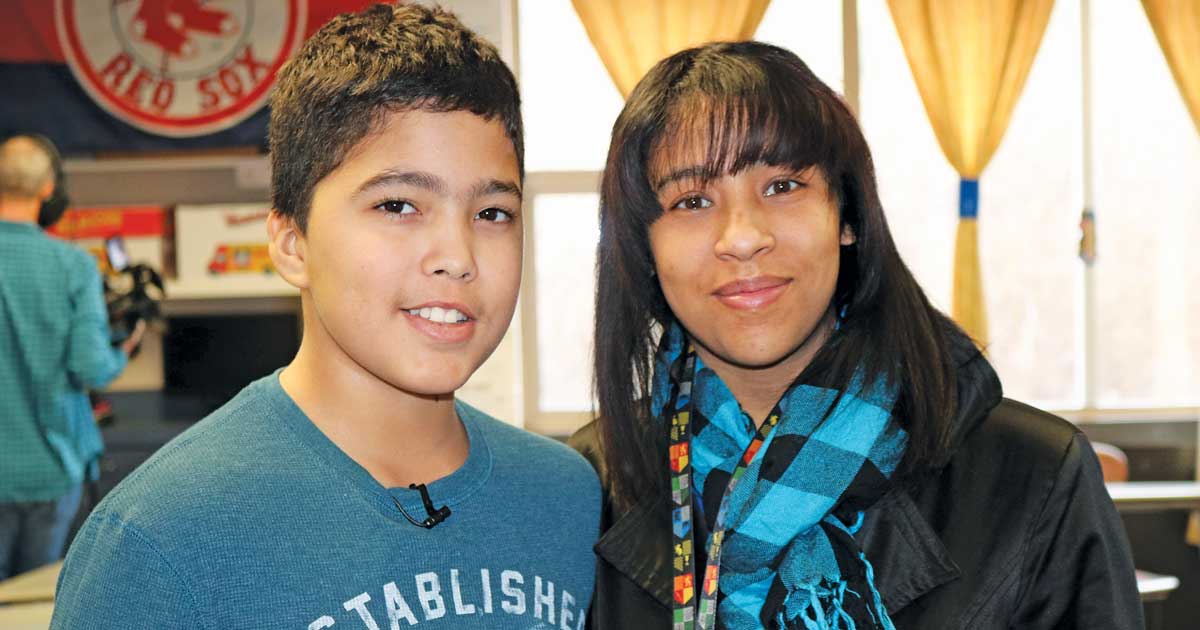A visiting student finds a warm welcome in Worcester
A visiting student finds a warm welcome in Worcester
Laura Barrett,
Communications Specialist
A visiting student finds a warm welcome in Worcester
Laura Barrett,
Communications Specialist

English learners who arrive in Massachusetts in the middle of the school year after a disaster at home need more than language instruction and academics. They need new friends and support from school staff.
Nirvan Serrano, 12, found both at the Sullivan Middle School in Worcester.
Nirvan and his older sister were sent to the U.S. mainland in October to live with their aunt and uncle. Their school in Arecibo, Puerto Rico, was closed after Hurricane Maria due to a lack of water and electricity, and their parents had to stay behind.
Stories like Nirvan’s are repeated throughout the state, with schools welcoming more than 2,300 students since the hurricane.
When he arrived, Nirvan spoke only Spanish. Two months later, he was asked how his English was coming along.
“I know a little bit,” he said. “You speak to me in English, I know what you say, but I can’t explain in English.”
When he first arrived, he experienced culture shock.
“Everything was different,” he said. “It’s so cold. I like that. In Puerto Rico it’s hot. The lockers and the lunch are strange for me.” He explained with the help of hand gestures that in Puerto Rico, the school schedule remains the same every day, while at Sullivan the schedule rotates.
Paraeducator Yahaira Rodriguez, assigned to the seventh-grade classes that took in the newcomers, said, “At first they were always lost in school. I was going into the hallway trying to find them because they were often on a different floor. And then they couldn’t talk to everybody because they didn’t have the language.”
By mid-December, the hurricane refugees were hearing lessons in English, but they still needed help with translation.
After Nirvan’s history and social studies teacher, David Thompson, explained the next steps in their project on Egypt, Rodriguez went over the instructions again in Spanish.
Thompson had also painstakingly recreated texts about the Egyptian gods and the Nile River in Spanish using Google Translate so the newcomers could keep up. While the recently repealed Sheltered English Immersion law envisioned nearly all instruction taking place in English, districts had to take advantage of the proviso that a student’s native language can be used for clarification.
Asked what went through his mind when his teacher spoke, Nirvan said, “When he speaks English, in my head I try to translate into Spanish. If I don’t know something, I ask Limbert or Ms. Rodriguez."
Limbert is Limbert Lavandier, the secret weapon of the class. A cheerful, helpful student who is fully bilingual, Limbert arrived in the U.S. when he was in first grade.
He picked up the language quickly.
“I was little, so I was like a little sponge,” he said with a grin. “I remember I would learn how to say ‘bicycle’ and I would run to my mom and say, ‘Mom, I know how to say ‘bicycle’ in English!’ I mean, it was hard. At first you think it’s Chinese. But then you learn.”
In the first week of December, Nirvan learned that his school in Arecibo was going to reopen and that he would be returning home. He was happy he would be seeing his family again, but sad to be leaving his new friends.
For Nirvan’s last day at school on Dec. 15, Rodriguez organized a farewell party for him and invited his closest friends. They had pizza and potato chips and talked about what they were going to miss about Nirvan.
Rodriguez played a video she had made of the class wishing him well. It ended with a loud chorus of shouts of “goodbye.”
Nirvan looked down and rubbed his eyes. His classmates surrounded him and moved in close.
“It’s OK to cry, guys,” said Rodriguez, wiping away her own tears. “We all miss our friends.”
Nirvan said something to her in Spanish, and she laughed and translated, “He says, ‘I’m not crying, I’m sweating through my eyes.’”
The group burst out laughing and gave their new friend a goodbye hug.
This story originally appeared in the Winter 2018 edition of MTA Today.